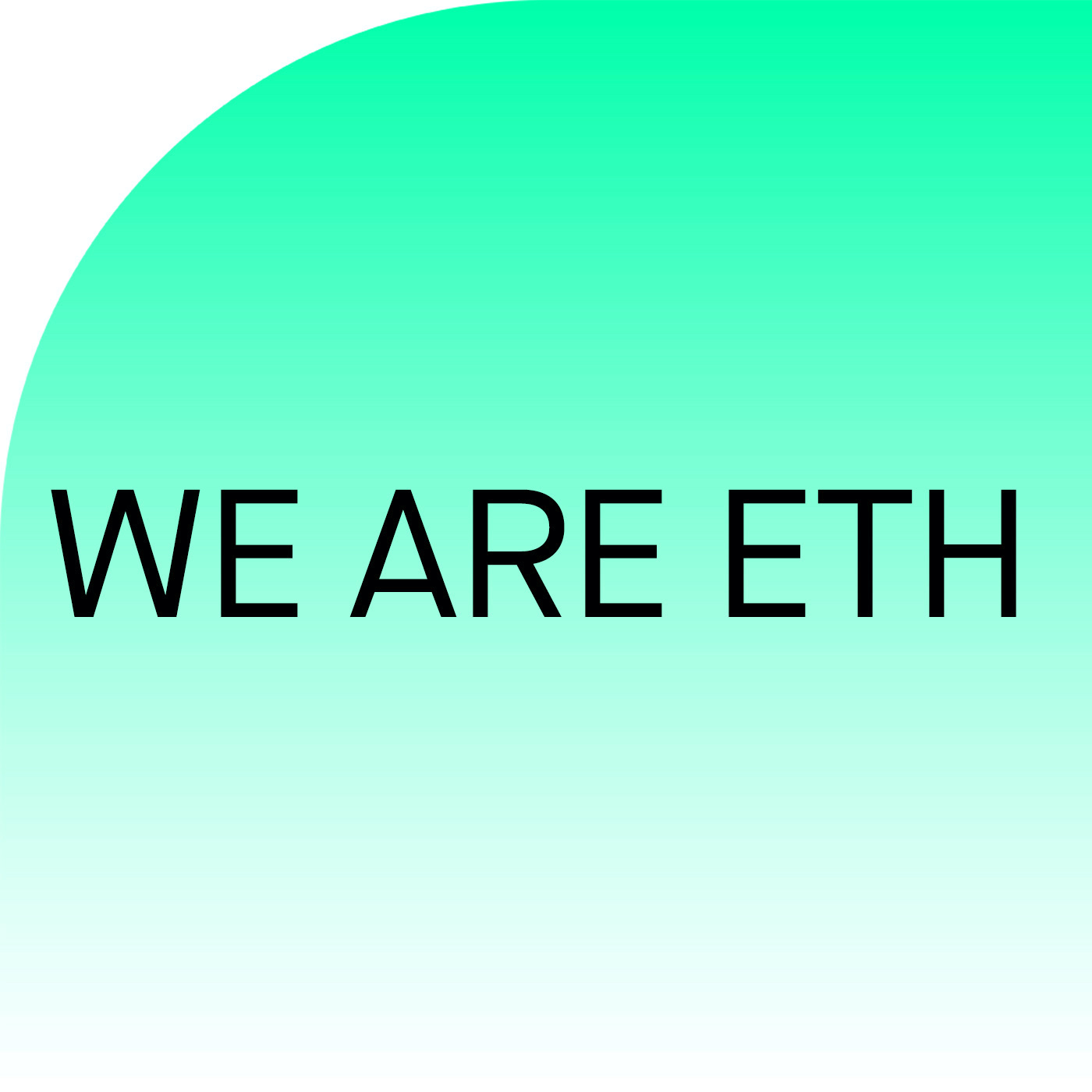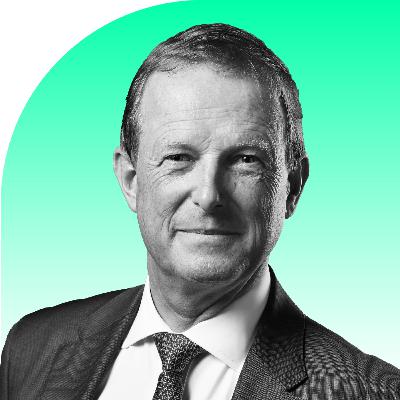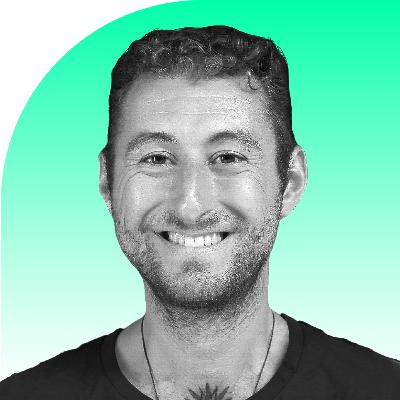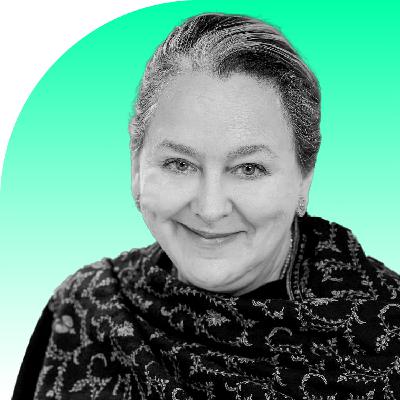Discover We Are ETH
We Are ETH

We Are ETH
Author: ETH Zurich
Subscribed: 12Played: 242Subscribe
Share
© Copyright 2025 ETH Zurich
Description
We Are ETH is a podcast series featuring stories from Alumni of ETH Zurich around the globe. Hosted by ETH Circle Member and Entrepreneur Susan Kish, We Are ETH brings you conversations with the people who have taken their ETH experience out into the world and turned it into a company, a career, and a way of life.
70 Episodes
Reverse
In this episode of We Are ETH, host Susan Kish talks with Dr. Estefanía Tapias, ETH Zurich alumna and smart-city expert, about building resilient, people-centered cities. Estefanía traces a path from Bogotá to Zurich, through the Future Cities Lab in Singapore, to her current work in Dubai, advising on urban development across the Gulf. She explains how extreme heat reshapes street design, materials, and building operations, why public transport, shading, and walkability still win in hot climates, and how to scale sustainable construction. The conversation explores Saudi Arabia’s NEOM and other build-from-scratch projects, weighing bold vision against practical constraints. Estefanía reflects on “living the problems” before critiquing, how Zurich shaped her systems view, and how data bias and missing perspectives can distort planning models. She closes with advice for young planners: go where change is happening, blend tech with anthropology, and test ideas in real streets.(00:00:48) Introduction: From Colombia to Dubai(00:02:03) The Middle East's Technology Transformation(00:02:34) Combining Urban Planning with Technology(00:03:39) Public Transportation and Urban Design(00:05:22) Falling in Love with Zurich(00:07:07) Working with Visionary Professor Gerhard Schmitt(00:09:13) Understanding Extreme Heat and Climate Adaptation(00:12:41)Living the Problems Before Criticizing(00:13:31)Cities Built from Scratch: Saudi Arabia's Opportunity(00:16:49) NEOM: Successes and Challenges(00:19:08) Advice for Young Urban Planners(00:20:16) What Makes ETH Special(00:21:20) Curiosity About Future Cities(00:22:17) Data Bias and Diverse Perspectives in Technology
Host Susan Kish talks with Roman Engeler, ETH Zurich alumnus and co-founder of Atla, about how modern AI agents make decisions and how to keep them safe, reliable, and fast. Roman explains traces – the step-by-step records of an agent’s reasoning – s and shows how Atla helps teams debug, evaluate and improve agent performance at scale. He shares the move from ETH research to building a company in London, compares startup cultures in Zurich, Palo Alto and London, and reflects on how ETH’s rigor translates into product execution. The conversation covers the promise and risks of growing autonomy, why guardrails matter for real deployments, and ways alumni can give back, including the Founder’s Pledge. Clear, candid and practical, this episode is for anyone shaping the next wave of intelligent systems.Chapters:(00:00:48) Living in London: Startup Scene Comparison(00:03:36) From Research to Startups: Roman's Journey(00:05:33) What Are AI Agents and Traces?(00:07:30) Introducing Atla: Debugging AI Agents(00:09:24) Case Studies: Real-World Applications(00:11:08) Pricing Model and Customer Success(00:13:43) The ETH Difference: Rigor and Freedom(00:16:05) Founder's Pledge: Giving Back to ETH(00:18:21) The Future of AI: Progress and Predictions(00:21:42) Advice for Future AI Students(00:23:42) Giving Back: Scholarships and Support(00:25:19) Personal Questions: Growing Up and Early Dreams(00:26:03) Current Reading: Biographies and AI Safety(00:28:34) Favorite Zurich Spot and Closing
In this episode of We Are ETH, host Susan Kish sits down with ETH alumni Sue Tobler (physics) and Remo Gisi (computer science). They are the cofounders of Tastelab, a culinary studio that turns algorithms and physics into unforgettable plant based dining. Sue and Remo share how they moved from corporate careers to entrepreneurship and how they use data analysis, sensory testing, and event storytelling to design dishes where science amplifies joy. They explain their approach to algorithmic recipe development, texture and heat transfer informed by physics, and a pragmatic view of sustainability that showcases what is possible rather than prescribing limits. Along the way they reflect on lessons in negotiation, balancing creativity and constraints, and building a business that finds the sweet spot between precision and play. From pop up gastronomy to bespoke experiences, Tastelab shows that the future of food can be deliciously data driven and truly memorable.books mentioned in the podcast:Book of ideas (Sue)https://www.amazon.com/Rel%C3%A6-Ideas-Christian-F-Puglisi/dp/1607746492Goliath's Curse (Remo)https://en.wikipedia.org/wiki/Goliath%27s_Curse(00:59) The Passion for Food(02:48) Cooking as Science(06:43) Creating Memorable Experiences(11:38) Sustainability in Culinary Arts(16:46) The Journey to Taste Lab(28:08) Advice for Aspiring Innovators(30:00) Closing Thoughts and Reflections
In this episode of We Are ETH, host Susan Kish talks with Péter Fankhauser, CEO and co-founder of ANYbotics, about his journey from an ETH Zurich spinoff to leading one of the world’s most exciting robotics companies. Péter shares how his fascination with robots turned into a global business, the real-world challenges of scaling deep-tech innovation, and why combining AI with robotics is transforming industries. From oil and gas inspections to autonomous machines designed for complex and dangerous tasks, ANYbotics is showing how robots can take on work once thought impossible – while deliberately steering clear of military applications. Along the way, Péter offers candid advice for aspiring entrepreneurs: get out of the lab, listen to your customers, and embrace leadership that goes beyond engineering. This episode is a front-row seat to the future of robotics, and to the mindset that makes it possible.Books mentioned in this episode:The Hard Things About The Hard Things - Ben Horowitzhttps://www.amazon.de/Hard-Thing-About-Things-Building/dp/0062273205Build - Tony Fadellhttps://www.amazon.com/Build/dp/1787634108Chapters:(00:43) Peter Fankhauser's Journey into Robotics(01:23) The Focus Project at ETH Zurich(02:17) Building the Inverted Pendulum Robot(03:31) The Tipping Point in Robotics(04:52) Founding Anybotics and Embracing AI(06:03) Funding and Scaling Anybotics(08:23) Applications of Robotics in Industry(11:34) Ethical Considerations and Future of Robotics(19:47)Advice for Aspiring Entrepreneurs(22:19) Closing Thoughts and Reflections
ETH Zurich is reaching for the stars – literally. In this special episode of We Are ETH, host Susan Kish speaks with techno-magician Marco Tempest and innovation strategist Dr. Nanja Strecker, two visionary forces behind ETH Zurich’s rapidly growing space ecosystem. They explore how ETH is transforming itself into a launchpad for space innovation, education, and entrepreneurship: through bold initiatives like the Master program in Space Systems and the PI Innovation Hub, which connects deep tech research with real space missions. The conversation highlights the role of Switzerland in the lunar economy, the creative and technical challenges of building for space, and how ETH’s interdisciplinary strength is positioning it at the forefront of this next frontier. Marco and Nanja also share their personal journeys and what it will take to prepare the next generation of space pioneers and entrepreneurs.Chapters:(01:27) The Magic and Fascination of Space(03:07) Space Startups and Entrepreneurship(07:39) ETH Zurich's Role in Space Innovation(12:15) Thomas Zurbuchen's Journey to ETH(19:52) ETH Zurich's Space Master's Program(25:29) Personal Insights and Recommendations(33:00) Conclusion and Closing Remarksbooks mentionned in this episode:Nanjas recommendations:The Culture Map - Erin Meyerhttps://erinmeyer.com/books/the-culture-map/The Space Economy - Chad Andersonhttps://www.spacecapital.com/space-economy-bookMarcos recommendations:Signs Of Storytelling - Will Storrhttps://www.thescienceofstorytelling.com/Mindware - Tools for Smart Thinking - Richard Nisbetthttps://lsa.umich.edu/psych/people/emeriti-faculty/nisbett.html
Olympic medalist, world champion cyclist, engineer, and cookbook author – Dr. Emma Pooley has never fit into a single box. In this episode of We Are ETH, host Susan Kish sits down with the ETH Zurich PhD alumna to talk about her extraordinary path from Cambridge mathematics student to elite endurance athlete and published author. Emma shares how switching to engineering helped her make sense of the world, how she trained for the Olympics while finishing her doctorate, and why her ETH supervisor Sarah Springman played a pivotal role in making it all possible. They discuss the joys and chaos of racing bikes, adjusting to life in Zurich, writing her deeply personal cookbook OAT to Joy, and what it takes to balance ambition with wellbeing. This episode is a warm, honest, and energizing reminder that it’s possible to pursue excellence – without giving up joy.(01:01) Emma's Academic Journey(01:54) Transition to Engineering(03:09) Moving to Zurich(04:43) Discovering Cycling(07:04) Early Cycling Challenges(10:07) Balancing PhD and Cycling(12:58) PhD Research Explained(15:10) Balancing Athletics and Personal Growth(16:12) Experiences at ETH Zurich(16:42) Cycling Challenges and Crashes(17:38) Transitioning from Cycling to Triathlon(18:25) Publishing a Cookbook(20:55) Career Shift to Engineering
In this episode of We Are ETH, host Susan Kish speaks with Dr. Einat Kalisch-Rotem, the first woman mayor of Haifa and a visionary force in modern urban planning. Trained as an architect at ETH Zurich, Einat shares how her ETH experience shaped the bold strategies she’s using to reimagine Haifa’s future. From creating Israel’s first bilingual school to fighting for better public transportation and more livable, inclusive spaces, she reveals how thoughtful design can transform cities. Einat talks candidly about navigating political hurdles, breaking new ground in sustainable urban development, and her drive to position Haifa as a hub of culture, tourism, and innovation. This episode offers an inspiring look at how leadership, vision, and design can work together to reshape a city for the challenges of the 21st century.(00:27) Meet Dr. Einat Kalish-Rotem: Architect, Urban Planner, and Mayor(00:53) Zurich's Influence on Urban Planning(01:41) Challenges and Achievements in Haifa's Infrastructure(01:45) The Journey into Politics(04:14) The Vision for Haifa's Future(05:01) The Impact of Zurich on Leadership(06:18) Anthropological Insights and Public Spaces(10:09) Political Challenges and Triumphs(20:42) Future Endeavors and Reflections(22:14) Closing Thoughts and Reflections
Dr. Jan Wurzbacher, ETH alumnus and co-founder of Climeworks, joins host Susan Kish to talk about the urgent need—and emerging science—behind removing CO₂ from the atmosphere. Born out of a vision shared with fellow ETH engineer Christophe Gebald, Climeworks has grown from lab experiments at ETH Zurich to building the world’s first large-scale direct air capture plants in Iceland. Jan explains the mechanics of carbon capture using sorbent materials, the hurdles of scaling such a system, and how engineering and climate science must work together to meet the planet’s carbon removal targets. He also reflects on the importance of market creation, policy support, and public trust as Climeworks moves toward its ambitious goal of gigaton-scale CO₂ removal by 2050. This episode is a deep dive into innovation at the edge of climate action—and a rare look inside one of ETH Zurich’s most impactful spin-offs.books mentioned in this episode:Jim Collins «From Good to Great».Verne Harnish «Scaling Up»chapters:(00:27) Meet Dr. Jan Wurzbacher: Co-Founder of Clime Works(00:56) The Origin Story: Meeting at ETH(02:19) Applying Mechanical Engineering to Climate Change(02:31) How Clime Works Extracts CO2 from the Air(03:26) Building and Scaling Clime Works(05:16) Challenges and Innovations in CO2 Removal(08:03) Early Prototypes and Market Development(11:39) Scaling Up: From Pilot to Gigaton Scale(17:48) The Future of CO2 Removal and Personal Actions(19:34) Leadership and Organizational Growth(22:44) Closing Thoughts and Personal Insights
Marine biologist and ETH alumna Dr. Ulrike Pfreundt shares her journey from rainforest activism to coral reef regeneration. As co-founder and co-CEO of RRREEFS, she is pioneering a novel approach to rebuilding lost reef ecosystems—using 3D-printed clay structures inspired by architecture, biology, and fluid dynamics. In conversation with host Susan Kish, Ulrike explains how coral reefs protect coastlines, why reef loss is accelerating, and how interdisciplinary collaboration at ETH Zurich sparked her mission. She speaks candidly about the challenges of scaling impact, the importance of transparency in climate work, and the need to rethink financial models for regeneration. From dive training on Elba to launching one of the world’s most innovative reef restoration startups, Ulrike’s story is a powerful testament to curiosity, purpose, and the power of science to heal ocean ecosystems.books mentioned in the episode:Bernhard Kegel - Graschapters:(00:32) Meet Dr. Ulrike Pfreundt and RRREEFS(01:27) The Meaning Behind RRREEFS(02:09) Corporate Values and Mission(03:32) Challenges and Goals in Coral Reef Restoration(06:00) Understanding Coral Bleaching(09:55) Dr. Pfreundt's Journey into Marine Science(12:49) Innovative Approaches to Reef Restoration(16:26) Interdisciplinary Collaboration at ETH(22:16) Final Thoughts and Reflections(27:32) Closing Remarks and Podcast Information
In this episode, host Susan Kish speaks with Professor Margarita Chli, a leading figure in robotic vision and autonomous systems. As the head of the Vision for Robotics Lab at ETH Zurich and the University of Cyprus, Professor Chli discusses how her research enables drones to perceive and navigate complex environments. She delves into the challenges of developing vision systems for autonomous drones, the potential applications in areas like wildfire management and search and rescue, and the importance of interdisciplinary collaboration in advancing these technologies. The conversation also touches on the ethical considerations of dual-use technologies and the role of curiosity in scientific discovery. This episode offers insights into the cutting-edge work at the intersection of robotics, AI, and real-world applications.Chapters(00:26) Meet Professor Margarita Chli(01:07) Understanding Vision in Robotics(03:24) Challenges in Robotic Vision(05:38) Swarm Robotics and Communication(10:56) Hardware vs. Software in Robotics(13:47) Drones in Warfare and Humanitarian Efforts(17:54) The Future of Robotics and AI(19:48) Personal Insights and Curiosities
In this follow-up episode, Benjamin Bollmann, CEO of Swissnex Brazil, delves into Brazil’s prominent role in global climate initiatives, particularly with the upcoming COP30 in the Amazon. He explains how Swissnex is working to foster international cooperation, focusing on the intersection of scientific research, local knowledge, and sustainable development. Benjamin also highlights Brazil’s potential as a leader in green energy and bio-economy, while emphasizing the importance of interdisciplinary collaboration to address climate challenges. Drawing comparisons between innovation ecosystems across Boston, Silicon Valley, Zurich, and São Paulo, he discusses how different approaches contribute to advancing sustainability solutions. This episode offers a grounded perspective on how countries like Brazil are positioning themselves within the global dialogue on climate action. Chapters:(01:36) Brazil on the World Stage(02:13) Swissnex Brazil and COP30(03:18) The Göldi Museum and Swiss Legacy(06:01) Innovation Ecosystems Around the World(07:55) Comparing Boston and Silicon Valley(11:54) Personal Insights and Reflections(18:23) Closing Thoughts and Farewellbooks mentioned in the episode:Facing Gaia – Eight Lectures on the New Climatic Regime (Bruno Latour)Lina Bo Bardi 100 – Brazil's Alternative Path to ModernismAmazonia by Marcio Souza
ETH alumnus Benjamin Bollmann, CEO of Swissnex Brazil, discusses his diverse path from ETH Zurich to his leadership role at Swissnex, connecting science, innovation, and education. With a background in neuroscience and technology from ETH Zurich and MIT, Benjamin reflects on the challenges and opportunities of building global partnerships. Comparing innovation ecosystems from Boston’s deep tech to Silicon Valley’s digital innovation and Zurich’s research-driven approaches, he highlights the distinct strengths of each region. Now based in São Paulo, he shares his experiences navigating the unique innovation environment of Brazil, particularly through Swissnex’s initiatives to support Swiss startups and foster global collaborations in science and technology. This episode provides valuable insights into the evolving landscape of international innovation and collaboration.Chapters:(00:28) Settling into Sao Paulo(02:48) Benjamin's Journey: From Skateboarding to Science(05:39) Academic Pursuits and Neuroscience(08:06) The Boston Experience and MIT(11:29) Creating Neural Architectures(13:10) Swissnex: A Global Network(15:51) Reflections on ETH and Interdisciplinary Learning(19:46) Conclusion and Upcoming Topicsbooks mentioned in the episode:Facing Gaia – Eight Lectures on the New Climatic Regime (Bruno Latour)Lina Bo Bardi 100 – Brazil's Alternative Path to ModernismAmazonia by Marcio Souza
ETH alumnus Guillaume Othenin-Girard, an assistant professor at the University of Hong Kong and co-founder of the Architectural Land Initiative, explores how architecture connects history, sustainability, and social impact. From a Dezeen Award-winning project in Peru, where he led ETH and Peruvian students in designing a community-focused structure at an endangered archaeological site, to his ongoing work in Armenia, Guillaume’s journey spans continents and cultures. He shares insights into traditional construction methods, the role of local materials in modern architecture, and the challenges of teaching design in a digital world. Reflecting on his time at ETH Zurich, he highlights how interdisciplinary thinking and hands-on learning have shaped his career. This episode offers a compelling look at the intersection of architecture, heritage conservation, and global collaboration.Books mentioned in this episode:Lukas Bärfuss, Vaters Kiste: Eine Geschichte über das Erben Joseph Kessel, Les CavaliersUrsula K. Le Guin, The Carrier Bag Theory of FictionChapters:(00:25) Meet Guillaume Othenin-Girard: From Switzerland to Hong Kong(01:56) Navigating the Pandemic in Hong Kong(04:04) Teaching Design and Architecture During COVID(06:55) The Pachacamac Project in Peru(15:38) Exploring the Armenia Project(17:43) Founding the Architectural Land Initiative(21:04) Personal Insights and Reflections(23:24) Conclusion and Podcast Information
Fabienne Ziadi Künzli, a Swiss fish ecologist and ETH Zurich alumna, takes us from Zurich to Okinawa, where she studies the intricate world of fish behavior and marine ecosystems. From the astonishing adaptability of mudskippers—fish that can walk on land—to the urgent threats facing shark populations, Fabienne’s work bridges species ecology, conservation, and climate science. She explains how micro-CT helps uncover the secrets of fish anatomy and sheds light on how climate change and human activity are reshaping ocean life. A passionate advocate for education and outreach, she works to shift public perceptions of sharks and highlight their critical role in marine ecosystems. Reflecting on her time at ETH Zurich, she shares how curiosity and a strong research foundation shaped her career and commitment to ocean conservation.This episode is a must-listen for anyone fascinated by marine life and the challenges of protecting it.Book mentioned in this episode:The Song of the Dodo by David Quammenchapters:(00:00) Introduction: The Impact of Shark Fishing(00:17) Meet Fabienne: A Journey into Ichthyology(02:13) Fascinating Mudskippers: Fish That Walk on Land(04:07) Innovative Research Techniques in Fish Anatomy(10:34) Challenges in Fish Ecology and Conservation(16:56) Changing Perceptions: The Importance of Sharks(18:35) Reflections on ETH Zurich and Career Insights(21:35) Personal Insights and Recommendations(24:58) Conclusion and Farewell
Learn about quantum computing with ETH alum Fabio Scafirimuto, who shares quantum basics, career opportunities, and his inspiring journey from ETH Zurich to IBM Quantum.ETH alum Fabio Scafirimuto, Education & Workforce Lead for IBM Quantum in EMEA, breaks down quantum basics—qubits, superposition, and entanglement—while sharing his journey from ETH Zurich to IBM Quantum. Learn about the challenges of making quantum tech accessible, future job prospects in this cutting-edge field, and Fabio's personal passions beyond physics.Books mentionned in the episode:Sourrounded by idiotsChapters:(01:21) Basics of Quantum Computing(01:56) Understanding Qubits and Superposition(03:52) Entanglement Explained(06:01) Quantum Gates and Their Functions(07:14) Challenges in Quantum Education(12:20) Career Opportunities in Quantum Computing(15:36) Fabio's Academic and Professional Journey(18:00) Reflections on Research and Teaching(22:14) Personal Interests and Recommendations(26:15) Conclusion and Farewell
Grace Crain-Wright, a plant ecologist and STEM educator, takes us on an extraordinary journey from her academic roots in the US to her cutting-edge research at ETH Zurich. As a key figure in the European Space Agency’s MELiSSA project, Grace pioneers nutrient recycling technologies for sustainable space travel, bridging environmental and space sciences. Her work embodies interdisciplinary innovation, integrating indigenous knowledge and multicultural perspectives to tackle global challenges. Beyond research, Grace inspires future generations through the GLOBE program, engaging students worldwide with hands-on STEM education tied to earth and space sciences. Her reflections on balancing life, mentorship, and science highlight the human side of discovery, offering a compelling narrative of resilience, innovation, and a passion for creating a sustainable future both on Earth and beyond.Chapters:(00:00) Introduction to Science Beyond the Lab(00:17) Meet Grace Crain-Wright: Plant Ecologist and STEM Educator(00:59) Grace's Journey Across the States and Europe(01:56) PhD Research at ETH Zurich(02:27) Challenges and Discoveries in Space Agriculture(08:15) The GLOBE Program and STEM Education(14:32) Grace's Passion for Extreme Environments(20:42) Reflections on ETH Zurich Experience(29:15) Teaching and Inspiring Future Scientists(30:28) Closing Thoughts and Personal Insights
ETH alumnus Christophe Gence shares his journey from mechanical engineering to leading Paprec, exploring innovations in recycling and the importance of lifelong learning and networking.ETH alumnus Christophe Gence talks about his journey from mechanical engineering to leading Paprec Switzerland and emphasises the innovations that transform waste into secondary raw materials. He sheds light on technologies such as AI-driven sorting and PET recycling and explains the cultural, legal and technological changes that characterise sustainable waste management. Personal stories emphasise the value of networks, lifelong learning and the lessons he learned at ETH Zurich.
Mark Essam Zahran, ETH alumnus, co-founder and CEO of Swiss vertical farming pioneer Yasai, shares how he transitioned from architecture to revolutionizing food production with innovative systems like hydroponics and aeroponics.Explore how vertical farming saves water, reduces imports, and creates sustainable local food systems. The discussion delves into the challenges and market acceptance of vertical farming, the industry’s future potential. Mark also shares his entrepreneurial journey, the power of collaboration, and his personal inspirations.Books mentioned in this episode:Playground by Richard PowersOverstory by Richard PowersFeeding the world in the 21st century by Dickson DespommierPodcasts mentioned in this episode:Joe Rogan Experience with Michio KakuLex FriedmanChapters:(00:43) Introduction to Chagaccino(02:08) From Architecture to Vertical Farming(04:52) The Concept of Vertical Farming(07:25) Market Acceptance and Global Demand(13:04) Entrepreneurial Journey and Inspirations(17:05) Reflections and Future Aspirations(24:04) Rapid Fire Questions(26:32) Closing Remarks
In this special We Are ETH episode, host Susan Kish shares her inspiring career journey, Nordic roots, and behind-the-scenes podcast insights.For this special episode, the tables turn as our regular host, Susan Kish, becomes the guest! Susan, an entrepreneur, strategist, and executive, opens up about her fascinating career journey—from her beginnings in investment banking to thriving as an entrepreneur and executive consultant.Susan reflects on her Nordic heritage, her strong connection to ETH, and the transformative power of storytelling. She also shares memorable moments from behind the scenes of We Are ETH, insights into the diversity of guests, and her favorite book recommendations for the holiday season.Books mentioned in the episode:Wind and Truth - Brandon SandersonChapters:(02:18) Susan's Multifaceted Career Journey(04:02) Connecting with ETH Zurich(07:59) The We Are ETH Podcast Experience(16:13) Behind the Scenes and Favorite Moments(19:01) The Essence of a Great Podcast(26:23) Holiday Traditions and Book Recommendations(30:08) Conclusion and Holiday Wishes
David Dao, ETH alumnus and GainForest scientist, shares his journey from climate activism to XPRIZE-winning AI innovations, supporting indigenous communities, and driving impactful solutions.David Dao, ETH Zurich alumnus, co-founder and chief scientist of GainForest, talks about his journey from climate activism, his experiences at the COP climate conferences to winning the XPRIZE. From AI innovation, valuable support for indigenous communities to mapping Brazilian nut trees, Dao reflects on his personal story as the son of Vietnamese refugees and how it has influenced his pursuit of meaningful impact. From preserving cultural heritage with AI to redefining climate finance, Dao offers a compelling narrative of resilience, innovation, and community-led action. This is his story.books mentioned in this episode:Matilda - Roald DahlChapters:(00:43) David Dao's Recent Experience at COP(02:19) Climate Finance Negotiations(03:53) Role of Youth Activists at COP(04:36) GainForest and the XPRIZE Journey(07:08) AI and Indigenous Communities(18:39) David Dao's Personal Journey(23:35) Final Thoughts and Reflections(26:13) Closing Questions









